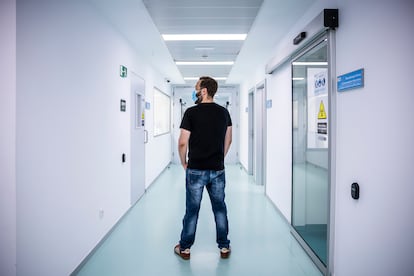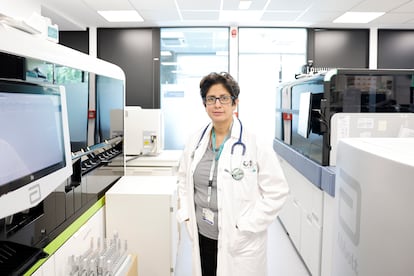‘Chemsex’: Doctors are concerned about the increasing use of drugs to have more intense and lasting sex
As sexually transmitted infections are skyrocketing, the practice is linked to a public health problem

Fernando, 41, describes his chemsex days as “a dark night.” The drugs that he began taking to maintain more intense and prolonged sexual relations —especially methamphetamine (as seen on Breaking Bad) and GHB (or liquid ecstasy)— ruined a time in his life: “My life began to be destroyed: my family ties, my work, my friendships. There comes a time when you find yourself alone and very depressed.”Practices like the ones he stopped —after a lot of therapy— are on the rise, especially in the community of men who have sex with men.
Infectious diseases clinics can attest to the growing phenomenon. At the clinic of the Gregorio Marañón Hospital in Madrid, in a single year the number of patients who were known to be regulars at chemsex sessions has multiplied by five. In 2017, the Madrid centers dedicated to drug addiction treated 50 people with problems related to chemsex; in 2022, the number of patients had multiplied by 10 to 512.

Dating apps play an important role in the explosion of sexual relations with strangers while under the influence of drugs. And, parallel to this phenomenon, there has been a general relaxation of condom use throughout society. “We have completely forgotten. We are no longer afraid of infections and sexually transmitted diseases: since we can prevent HIV, we forget about the others. But syphilis, gonorrhea…we don’t have respect for them,” says Dr. Maricela Valerio, infectious disease specialist at Gregorio Marañón Hospital.
Blaming these practices for the growing prevalence of sexually transmitted diseases would be simplistic. But experts are concerned about them. They bring together several risky practices: sex with unknown people, multiple partners at the same time, often without protection. “In this environment it is not normal for condoms to be used,” says Fernando.
HIV is the only STI that is not on the rise, surely in part thanks to Prep, a prescription prophylactic treatment that prevents infection. (There is a version for emergencies to be taken after exposure to a risk, similar to a morning-after pill.) The rest are on the rise. In the last 10 years, in Spain gonorrhea diagnoses have multiplied by six (12,359 cases) and those of syphilis have more than doubled (5,822). The STIs diagnosed are predominantly male: 82% of the patients are men.
Loneliness, shame and addiction
Throughout his life, Fernando had flirted with drugs. “Nothing special: parties, weddings, the usual stuff. At one point, emotionally everything began to collapse. Chemsex was a tool.” He fits the typical profile: mostly gay men, between 31 and 39 years of age, with a university degree, who live in towns with more than 100,000 inhabitants. “At first, you use it associated with sex. In the end, you end up not being able to have sex; you only consume. You can’t interact with anyone,” he explains.
The chemical cocktail in these sessions is a polydrug involving methamphetamine, GHB, mephedrone (3-MMC) and ketamine. All are NPS (new psychoactive substances) or emerging drugs, as they have been synthesized in recent years with small variations in their chemical structure to try to avoid the drug label. Although rare, there are deaths associated with them, mainly due to overdoses on GHB and meth.
What led Fernando to take drugs? “There is a lot of loneliness, judgment towards myself, shame, emotions we don’t like, that we try to avoid. In my life I did not get the tools to manage them, and now I am having to take care of them.” Fernando also talks about homophobia and adolescence: “When you start to have desire, to experiment, you realize that this is wrong. That is a wall. The fear of not being accepted, the aggressiveness, remains. That’s all part of the addiction.”
“This is called minority stress,” explains Iván Zaro, a psychologist at Imagina MÁS, who relates it to chemsex. “Gay men have seen attempts to devalue our masculinity. Body standards were imposed on us. Our attitude was attacked, and we were hypersexualized,” he stresses. “Often, the men who practice it are seeking to get away from a crushing reality through sexual experiences.”
“Methamphetamine is such a strong drug that it can take on all other addictions. I was using for three years. There came a time when the highs were continuous,” narrates Fernando. He began to inject himself: “That lasted a year. My mind was destroyed, my thoughts were crazy, I had crises, hallucinations, violence. It becomes hell.” When the rehabilitation process began, four years ago, all the problems that operate in chemsex were not addressed. “They knew how to treat alcoholics, cocaine addicts or heroin addicts,” he recalls, but they didn’t use the approach that experts now advocate: approach chemsex comprehensively, assessing not only the substances, but also the homophobic conditioning factors involved in chemsex.
“The majority of users come asking for psychological care. These are patients who have been wanting to reduce the amount of consumption for a long time or who have no other pastimes on the weekend,” explains Alba Alonso, a psychologist at Imagina MÁS who has worked with Fernando since he turned to the organization to end his addiction. “There are also issues related to sex life: some do not remember the last time they had sober sex,” adds Alonso, who warns that coming out of addiction takes time, often years.
“The process has been slow,” says Fernando, who still goes to therapy once a month. “Now I’m working and getting to know someone. I have my life back.” “I lived through my own hell. That suffering, and leaving it behind, has led me to respect myself and love myself more. I’ve become a person I like more.”
Sign up for our weekly newsletter to get more English-language news coverage from EL PAÍS USA Edition
Tu suscripción se está usando en otro dispositivo
¿Quieres añadir otro usuario a tu suscripción?
Si continúas leyendo en este dispositivo, no se podrá leer en el otro.
FlechaTu suscripción se está usando en otro dispositivo y solo puedes acceder a EL PAÍS desde un dispositivo a la vez.
Si quieres compartir tu cuenta, cambia tu suscripción a la modalidad Premium, así podrás añadir otro usuario. Cada uno accederá con su propia cuenta de email, lo que os permitirá personalizar vuestra experiencia en EL PAÍS.
¿Tienes una suscripción de empresa? Accede aquí para contratar más cuentas.
En el caso de no saber quién está usando tu cuenta, te recomendamos cambiar tu contraseña aquí.
Si decides continuar compartiendo tu cuenta, este mensaje se mostrará en tu dispositivo y en el de la otra persona que está usando tu cuenta de forma indefinida, afectando a tu experiencia de lectura. Puedes consultar aquí los términos y condiciones de la suscripción digital.








































